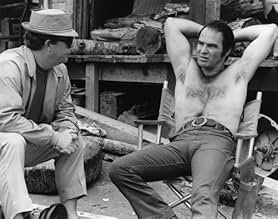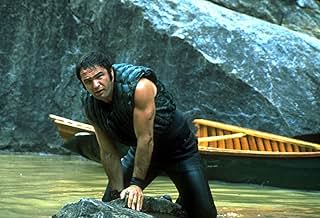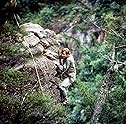Com a intenção de ver o rio Cahulawassee antes que seja represado e transformado em lago, o fanático por atividades ao ar livre Lewis Medlock leva seus amigos em uma viagem de canoa que eles... Ler tudoCom a intenção de ver o rio Cahulawassee antes que seja represado e transformado em lago, o fanático por atividades ao ar livre Lewis Medlock leva seus amigos em uma viagem de canoa que eles nunca esquecerão.Com a intenção de ver o rio Cahulawassee antes que seja represado e transformado em lago, o fanático por atividades ao ar livre Lewis Medlock leva seus amigos em uma viagem de canoa que eles nunca esquecerão.
- Indicado a 3 Oscars
- 2 vitórias e 14 indicações no total
Avaliações em destaque
True masterpiece genuinely done; very dark adventurous story about a group of men that are stuck in a situation after some creepy guys do some awful things and things spiral more from there! The sound editing & cinematography alone make this a wonderful experience along with a great cast!
I thoroughly enjoyed this menacing adventure; I'm sure it was difficult to make too. Movies aren't made like this anymore, so it's definitely nice to see this gem.
I thoroughly enjoyed this menacing adventure; I'm sure it was difficult to make too. Movies aren't made like this anymore, so it's definitely nice to see this gem.
Watching Deliverance tonight put me in mind of the great Elia Kazan film The Wild River which was about the Tennessee Valley Authority building a dam that would bury a certain island under water in the middle of the Tennessee River. On that island was a clan that was headed by Jo Van Fleet. In the end all they could do was move and Van Fleet die as the water swallowed up their homes and way of life.
The same thing is happening in Deliverance as four executives from Atlanta decide go on a fishing trip one last time two a river that's about to overflow its banks when a dam is being built. A whole town and a way of life is to be summarily wiped out and the locals aren't taking to kindly to city folks even they're from Atlanta and talk kind of like they do. These people might as well be from Mars. In fact in Georgia a certain governor named Gene Talmadge encouraged that kind of division with his county unit rule so that one had to get a majority of counties including the hillbilly ones in order to gain state office. The poor white trash that dominated in these counties had a stranglehold on the politics of Georgia for a generation and a half.
The four vacationers, Jon Voight, Burt Reynolds, Ned Beatty, and Ronny Cox get put through all kinds of hell by some of the locals when out on the river. It gets good and personal and draw your own conclusions there. In the end it's a fight for survival.
Director John Boorman wisely chose to opt for realism in telling this savage tale. He shot Deliverance on location in the wilds of rural Georgia and used some of the real population as extras to give it a proper flavor. The four leads all perform well and Ronny Cox and Ned Beatty made great big screen debuts that insured both long careers.
And there's that Dueling Banjos theme which is actually a guitar and a banjo and once heard will reverberate forever.
The same thing is happening in Deliverance as four executives from Atlanta decide go on a fishing trip one last time two a river that's about to overflow its banks when a dam is being built. A whole town and a way of life is to be summarily wiped out and the locals aren't taking to kindly to city folks even they're from Atlanta and talk kind of like they do. These people might as well be from Mars. In fact in Georgia a certain governor named Gene Talmadge encouraged that kind of division with his county unit rule so that one had to get a majority of counties including the hillbilly ones in order to gain state office. The poor white trash that dominated in these counties had a stranglehold on the politics of Georgia for a generation and a half.
The four vacationers, Jon Voight, Burt Reynolds, Ned Beatty, and Ronny Cox get put through all kinds of hell by some of the locals when out on the river. It gets good and personal and draw your own conclusions there. In the end it's a fight for survival.
Director John Boorman wisely chose to opt for realism in telling this savage tale. He shot Deliverance on location in the wilds of rural Georgia and used some of the real population as extras to give it a proper flavor. The four leads all perform well and Ronny Cox and Ned Beatty made great big screen debuts that insured both long careers.
And there's that Dueling Banjos theme which is actually a guitar and a banjo and once heard will reverberate forever.
Deliverance is the fascinating, haunting and sometimes even disturbing tale by James Dickey, turned into a brilliant movie by John Boorman. It's about four businessmen, driven by manhood and macho-behavior, who're spending a canoeing weekend high up in the mountains. Up there, they're faced with every darkest side of man and every worst form of human misery...poverty, buggery and even physical harassment! These four men intended to travel down the river for adventure and excitement but their trip soon changes into an odyssey through a violent and lurking mountain-land, completely estranged from all forms of civilisation. All these elements actually make Deliverance one of the most nightmarish films I've ever seen. Just about everything that happens to these men, you pray that you'll never find yourself to be in a similar situation. Pure talking cinema, Deliverance is a very important movie as well. John Boorman's best (closely followed by Zardoz and Excalibur) was - and still is - a very influential film and it contains several memorable scenes that already featured in numberless other movies. Just think about the terrific "Duelling banjos" musical score and, of course, the unforgettable homosexual "squeal like a pig" rape scene. All the actors deliver (haha) perfect acting performances. Especially Jon Voight. A must see motion picture!!
I first saw this on a vhs in the 90s, then on a vcd in 2006 n finally on a blu-ray. It's an extremely disturbing film especially the scene with Ned Beatty. One of the best backwoods/survival film of all time.
The film's awesome scenery, the sounds of birds, reptiles n insects n the gushing wild rivers combined with the absence of civilization are characters themselves.
We get to see Jon Voight doing some daredevil rock climbing and Burt Reynolds in his sleeveless t shirt flaunting biceps.
John Boorman has created one of the best movies based on James Dickey's novel. Indeed an influential movie. The banjo scene n the music is terrific.
I hadn't seen this movie in at least 20 years, but in the last few, it had started to itch away at my mind. I thought it terrific when I first saw it, but had I missed something even so? Was it more than just a disturbing adventure movie, in which city people run afoul of backwoodsmen?
So as soon as I saw the DVD, I bought it, even though it was obviously another Warner Bros. rush-it-out, never-mind-the-extras job.
The movie isn't as good as I remembered -- it's better. Those who are looking for a RIVER WILD thriller, or a SOUTHERN COMFORT (a DELIVERANCE imitation) suspense movie, are already looking in the wrong place. This movie is about what goes on inside people much more than it is about what goes on >around< them.
I've seen comments here suggesting that Ned Beatty doesn't show enough reaction after being brutally raped. Huh? He's stunned for ten minutes, then tries to attack Bill McKinney's >corpse<. He's still rattled the last time we see him in the movie, when he tells Jon Voight that they won't be seeing each other for a while. (Which clearly means forever.) Beatty's life has been changed; he'll never get over it.
So has Voight's, but in a different way. For the first time, I noticed that >three< people get into the tow truck when Reynolds hires those brothers to drive their cars to the canoeist's destination. Sure, that's logical -- there are three vehicles to drive initially, after all. But why does Boorman take pains to avoid showing us the face of the third person in the tow truck, but does show him fingering the gun in the rear window of the truck?
Could it be because this guy turns up later? Is he Bill McKinney's character? Or the Toothless guy? Or the guy Voight kills? Which of course raises the most important questions in the movie: WAS Ronny Cox shot? And if he was, was the guy Voight kills the one who shot him? (And was Voight's victim the Toothless guy?) On an initial viewing of the movie, all this seems pretty obvious: yes, Cox is shot; yes, Voight kills the right person, the Toothless guy.
But then what about the man we later learn has gone hunting but who hasn't returned? Why is Voight so shocked when he looks into the mouth of his victim? Boorman and Dickey give great weight to the scene in which Voight fails to kill a deer. (Even if he had, it would have been a foolish, wasteful act.) The interplay between Voight and Reynolds is also very interesting; Voight clearly admires Reynolds on some levels, while finding him disgusting on others.
Dickey is primarily a poet, secondarily a novelist; it's not hard to believe that he intended all four men to represent different aspects of the human condition. DELIVERANCE is one of the most intricately ambiguous movies of its type ever made; it cannot be pulled apart into easily-understood sections, and where our sympathies should lie is never obvious. Even the sheriff, played by Dickey himself, has darker shadings that are partly inexplicable. And there is that shot of the removal of the graves; it's not in there by chance or for local color.
On the surface, DELIVERANCE seems to be an exciting, disturbing adventure -- and it is that. But just like the secrets the lake conceals, there's a great deal more beneath the surface of DELIVERANCE.
So as soon as I saw the DVD, I bought it, even though it was obviously another Warner Bros. rush-it-out, never-mind-the-extras job.
The movie isn't as good as I remembered -- it's better. Those who are looking for a RIVER WILD thriller, or a SOUTHERN COMFORT (a DELIVERANCE imitation) suspense movie, are already looking in the wrong place. This movie is about what goes on inside people much more than it is about what goes on >around< them.
I've seen comments here suggesting that Ned Beatty doesn't show enough reaction after being brutally raped. Huh? He's stunned for ten minutes, then tries to attack Bill McKinney's >corpse<. He's still rattled the last time we see him in the movie, when he tells Jon Voight that they won't be seeing each other for a while. (Which clearly means forever.) Beatty's life has been changed; he'll never get over it.
So has Voight's, but in a different way. For the first time, I noticed that >three< people get into the tow truck when Reynolds hires those brothers to drive their cars to the canoeist's destination. Sure, that's logical -- there are three vehicles to drive initially, after all. But why does Boorman take pains to avoid showing us the face of the third person in the tow truck, but does show him fingering the gun in the rear window of the truck?
Could it be because this guy turns up later? Is he Bill McKinney's character? Or the Toothless guy? Or the guy Voight kills? Which of course raises the most important questions in the movie: WAS Ronny Cox shot? And if he was, was the guy Voight kills the one who shot him? (And was Voight's victim the Toothless guy?) On an initial viewing of the movie, all this seems pretty obvious: yes, Cox is shot; yes, Voight kills the right person, the Toothless guy.
But then what about the man we later learn has gone hunting but who hasn't returned? Why is Voight so shocked when he looks into the mouth of his victim? Boorman and Dickey give great weight to the scene in which Voight fails to kill a deer. (Even if he had, it would have been a foolish, wasteful act.) The interplay between Voight and Reynolds is also very interesting; Voight clearly admires Reynolds on some levels, while finding him disgusting on others.
Dickey is primarily a poet, secondarily a novelist; it's not hard to believe that he intended all four men to represent different aspects of the human condition. DELIVERANCE is one of the most intricately ambiguous movies of its type ever made; it cannot be pulled apart into easily-understood sections, and where our sympathies should lie is never obvious. Even the sheriff, played by Dickey himself, has darker shadings that are partly inexplicable. And there is that shot of the removal of the graves; it's not in there by chance or for local color.
On the surface, DELIVERANCE seems to be an exciting, disturbing adventure -- and it is that. But just like the secrets the lake conceals, there's a great deal more beneath the surface of DELIVERANCE.
Você sabia?
- CuriosidadesWhile filming the white water canoeing scene, Ned Beatty was thrown overboard and was sucked under by a whirlpool. A production assistant dove in to save him, but he didn't surface for thirty seconds. Sir John Boorman asked Beatty, "How did you feel?," and Beatty responded, "I thought I was going to drown, and the first thought was, how will John finish the film without me? And my second thought was, I bet the bastard will find a way!"
- Erros de gravaçãoWhen the cedar strip canoe breaks in half ((01:02:35), it breaks cleanly, indicating it was previously cut. It would have split, splintered and hinged together by the canvas skin.
- Cenas durante ou pós-créditosThe end credits only show the cast and a notice of where the location of the film was shot and the special thanks, which rolls over a shot of Ed and his wife laying down trying to sleep. It also shows the shot of the lake where the hand ascended up out of the water and the final credit reads 'Distributed by WARNER BROS'
- Versões alternativasThe original UK cinema version suffered minor BBFC cuts, including the removal of two lines of dialogue said by the toothless man when threatening Ed after the rape scene, "He got a real pretty mouth, ain't he?" and "You got to do some praying for me, boy, you better pray real good." Also, the death of the mountain man where he is seen struggling with the arrow through his chest was reduced. All later video releases were uncut.
- ConexõesEdited into La classe américaine (1993)
- Trilhas sonorasDuelling Banjos
Written by Arthur Smith (uncredited)
Arranged and played by Eric Weissberg, Steve Mandell
Principais escolhas
Faça login para avaliar e ver a lista de recomendações personalizadas
Detalhes
- Data de lançamento
- País de origem
- Idioma
- Também conhecido como
- Amarga pesadilla
- Locações de filme
- Chattooga River, Geórgia, EUA(Cahulawassee River)
- Empresas de produção
- Consulte mais créditos da empresa na IMDbPro
Bilheteria
- Orçamento
- US$ 2.000.000 (estimativa)
- Faturamento bruto mundial
- US$ 4.550
- Tempo de duração
- 1 h 49 min(109 min)
- Cor
- Proporção
- 2.35 : 1
Contribua para esta página
Sugerir uma alteração ou adicionar conteúdo ausente
































